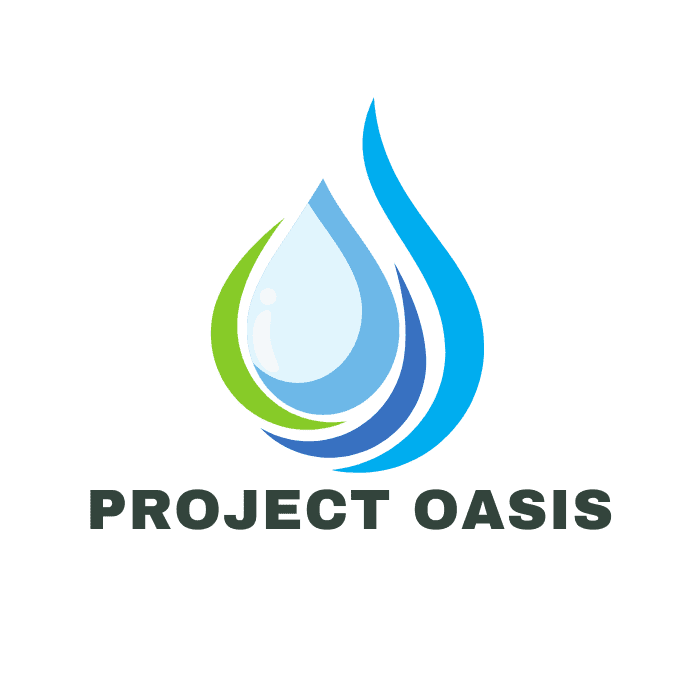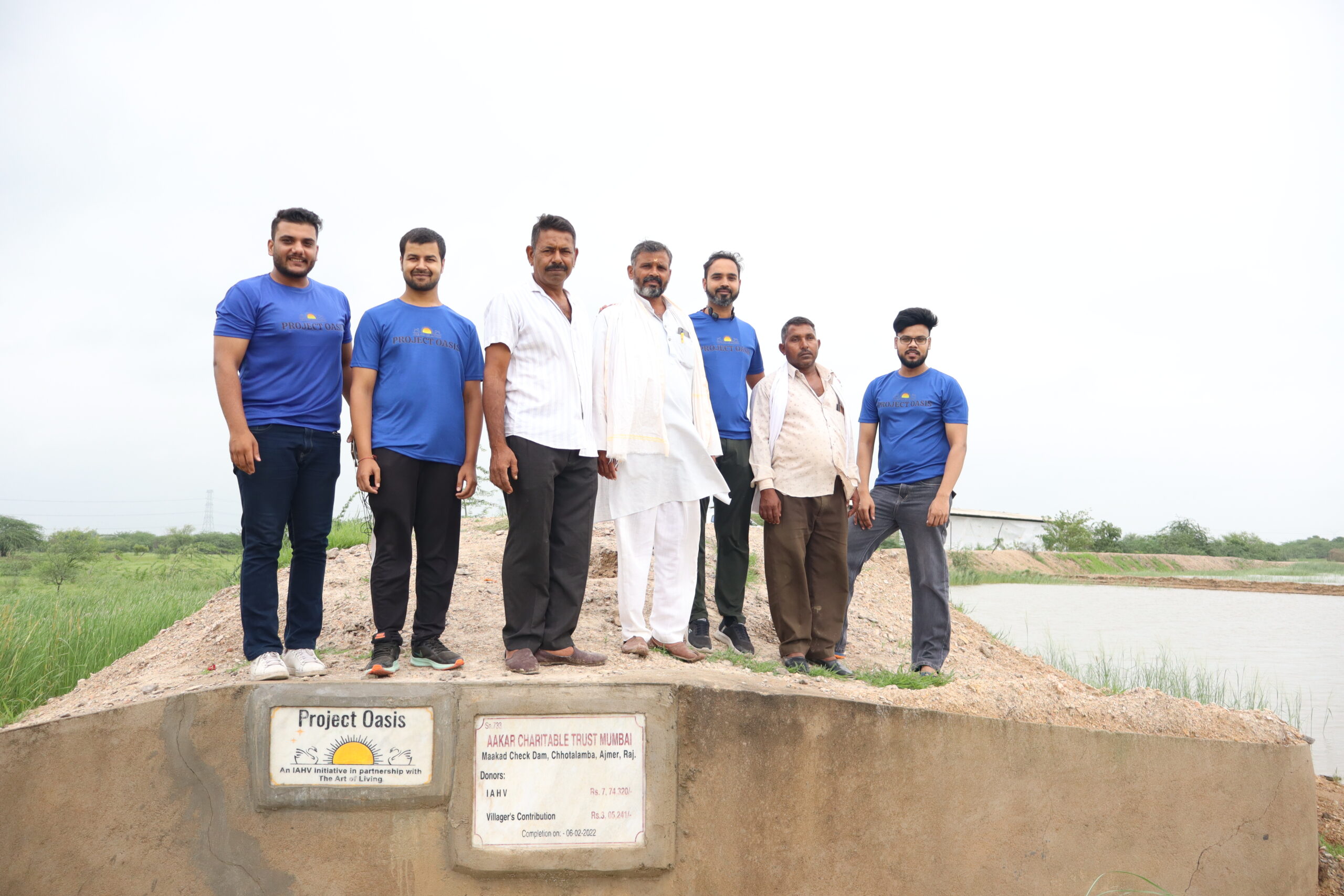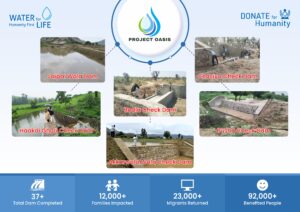How can we secure water for millions of rural villagers in India, where water scarcity is a daily
challenge? This pressing question drives the mission of Project Oasis, executed under the
International Association for Human Values (IAHV). With a focus on developing self-sustained water
resources, Project Oasis builds check dams to ensure year-round water availability through rainwater
harvesting. Our on-ground partner, Aakar Charitable Trust, has already built over 350 check dams,
transforming the lives of 400,000 people in and around Rajasthan.
The Water Crisis in Rural India
Water scarcity in India is a severe problem affecting approximately 97 million people who lack access
to clean drinking water. The situation is particularly dire in Rajasthan, which holds only 1% of the
country’s water resources but supports 6% of its population. Women and children are
disproportionately affected, often walking several miles daily to fetch water under the hot sun. This
effort limits their opportunities for education and economic activities and leads to harsh living
conditions. Furthermore, agriculture, a primary income source for many rural families, suffers due to
inadequate water supply, perpetuating a cycle of poverty.
What are Check Dams?
Check dams are small, sometimes temporary structures built across swales, drainage ditches, or
waterways. Their purpose is to counteract erosion by reducing water flow velocity and capturing
rainwater for future use. While check dams are not a new technology—they date back to the second
century AD—they remain highly effective for modern water management needs. By storing rainwater,
check dams recharge groundwater levels and provide a reliable water source for drinking and
irrigation throughout the year.
Project Oasis: A Game Changer
Project Oasis focuses on strategically identifying locations for check dams using scientific research
and local expertise. These structures are built in collaboration with villagers, ensuring community
involvement and sustainability. Our project aims to bring positive change to over 2 million villagers by
constructing 1,000 check dams by 2030.
In just three years, Project Oasis has contributed to over 30 check dams in Rajasthan. Alongside our
partner, Aakar Charitable Trust, which has completed 317 check dams, we have benefited more than
200,000 people in 182 villages across India. The ripple effect of these efforts indirectly impacts
285,000 people in 210 villages, making a significant dent in the water crisis.
The Multifaceted Benefits of Check Dams
- Water Conservation and Management:
Check dams play a crucial role in water conservation by capturing rainwater that would otherwise
run off. This stored water recharges groundwater levels, ensuring a continuous supply for agricultural
and domestic use. The increased groundwater availability helps maintain wells and borewells, which
are essential for daily water needs in rural areas. - Agricultural Enhancement:
Reliable water supply from check dams allows for consistent irrigation, leading to increased
agricultural productivity. Farmers can cultivate multiple crops throughout the year, improving food
security and economic stability. This enhancement in agricultural output directly benefits the rural
economy, providing better livelihoods for farmers and their families. - Economic Empowerment:
With consistent water availability, women and children spend less time fetching water and more time
on education and economic activities. This shift not only empowers women but also contributes to the
overall economic development of the community. Enhanced agricultural productivity further supports
this empowerment, as families can generate more income from their crops. - Mitigation of Migration:
Water scarcity often forces rural populations to migrate to urban areas in search of better
opportunities. By ensuring water security, check dams reduce the need for migration, allowing families
to stay together and contribute to the development of their local communities.
Real-Life Impact: Stories from the Ground
In Ajmer, the impact of Project Oasis is seen in stories like that of Rekha Devi. Before the check dam
was built in her village, Rekha spent several hours each day fetching water. Now, she uses that time
to cultivate her small farm, grow vegetables, and participate in local markets. This change has
increased her income and allowed her to invest in her children’s education.
Another inspiring story is that of Kamla Bai, who leads a team of women in maintaining the village’s
check dam. Kamla’s leadership has not only ensured the efficient functioning of the check dam but
also inspired many young girls in her village to pursue roles beyond traditional household duties.
These stories highlight the transformative power of check dams in rural water management.
The Broader Impact of Project Oasis
Project Oasis’s broader impact is reflected in the numbers: 12,000 families helped, 23,000 migrant
workers returned, and over 92,000 people benefited. For the year 2024, we have proposed six new
check dams in Rajasthan, located in Dungarpur, Pali, Udaipur, and Pratapgarh districts. These
projects are expected to benefit over 5,000 people, recharge numerous wells, and increase irrigated
land by thousands of acres.
Call to Action
Project Oasis’s mission is ambitious yet achievable. By 2030, we aim to build 1,000 check dams and
positively impact the lives of over 2 million villagers. However, we cannot do this alone. We need
continued support and collaboration to achieve our goals.
We invite you to join us in this transformative journey. Whether through donations, volunteering, or
spreading awareness, your contribution can make a significant difference. If you need assistance in
building a check dam in your location, mark us an email at projectoasis2@gmail.com. Together, we
can ensure that water, the lifeblood of communities, is available to all.
Conclusion
Check dams are a vital tool for securing water in rural India. They provide a sustainable solution to the
water crisis, empowering communities and improving lives. Project Oasis exemplifies how targeted
initiatives can address critical issues like water scarcity while fostering social and economic
empowerment. By building check dams and involving communities in their management, we create
ripples of positive change that will benefit generations to come.
As we move towards a future where water scarcity becomes an increasing challenge, initiatives like
Project Oasis provide a blueprint for sustainable solutions. Let’s support and expand these efforts to
ensure that every village has access to clean water and every individual has the opportunity to thrive.




